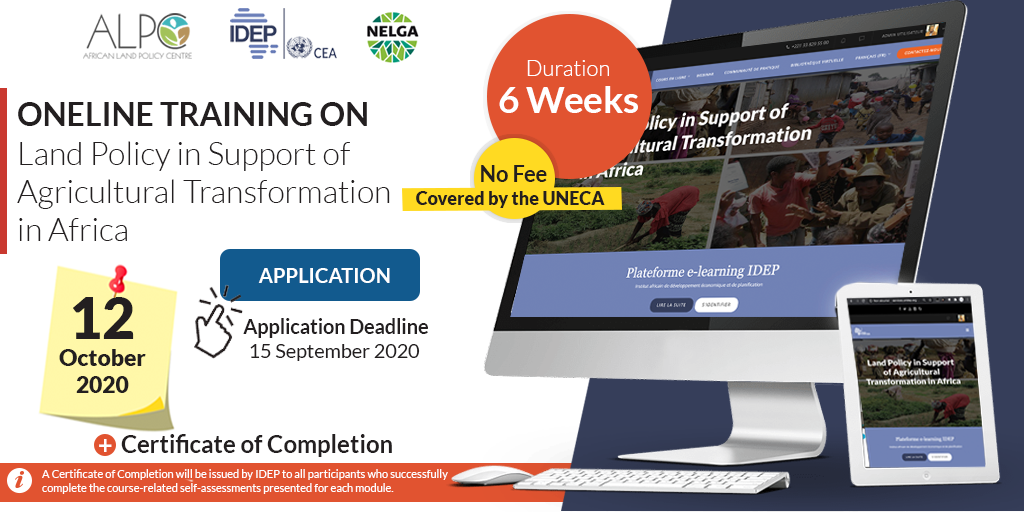Land Policy Support Agricultural Transformation Africa
PROGRAM RATIONALE
Land is the basis for social and economic activities. Societies who were able to put in place appropriate systems to secure collective and/or individual land rights, equitable access to land and manage land conflicts, experienced agricultural performance and overall economic growth. On the contrary, societies without good governance of their land resources faced conflicts over competing access and control of land, experienced poor agricultural development and hunger, and witnessed limited economic growth.
Africa host most of the arable land available in the world. It is widely acknowledged that 60% of uncultivated land in in the world are located in Africa (data from World Bank). If properly managed and developed, land resources will form the basis for agricultural transformation, food security, job creation and broad economic development in Africa. Conscious of the critical role of land in development, the world leaders adopted the SDGs in 2015 including land related targets and indicators. Under Goal 1 related to eradicating poverty, target 1.4 states that by 2030, governments should ensure that “all men and women, in particular the poor and the vulnerable, have equal rights to economic resources, as well as access to basic services, ownership and control over land and other forms of property, inheritance, natural resources, appropriate new technology and financial services, including microfinance”. For Goal 2 (zero hunger), target 2.3 envisages to “double the agricultural productivity and incomes of small-scale food producers, in particular women, indigenous people, family farmers, pastoralists and fishers, including through secure and equal access to land, other productive resources and inputs, knowledge, financial services, markets and opportunities for value addition and non-farm employment”. Under Goal 5 related to gender equality, governments are called to “undertake reforms in order to give women equal rights to economic resources, as well as access to ownership and control over land and other forms of property,
financial services, inheritance and natural resources, in accordance with national laws”.
The AU led Agenda 2063 adopted in 2015, sets clear development perspectives toward Africa’s economic transformation. Building on the deep expectations of the people Agenda 2063 articulates 7 aspirations with important land policy implications. Particularly, Aspiration 1 related to a prosperous continent, requires an improved governance of the land sector if the continent’s agriculture is to be transformed and modernized and if the quality of life of the people is to be improved through job creation, gender equality and provision of basic services. In 2009, African heads of State and Government had through a Declaration on land, committed to initiate national land policy development and implementation processes and ensure equitable access to land for all land users including the youth and other landless groups. They also resolved to give special attention to strengthening security of tenure for African women. In this perspective, all AU member states were urged to “review their land sectors with a view to developing comprehensive policies which take into account their peculiar needs” (AU Declaration on land).
The improvement of land policy development, implementation and monitoring will remain an aspiration, unless relevant human capacities are developed at different levels. It is against such a backdrop that the present online training is co-organized by the Economic Commission for Africa (ECA) through African Land Policy Center (ALPC), the African Institute for Economic Development and planning (IDEP), the Network of Excellence on Land Governance (NELGA) and the African Union Commission (AUC).
LEARNING OBJECTIVES
This online course aims to contribute to advancement of agricultural transformation, of Africa through improved governance of its immense land resources. The following overarching objectives will guide the IDEP
online training session :
- Sensitize trainees of the links between land governance and economic transformation of Africa
- Inform trainees on existing key continental and global commitments on land policy and governance;
- Highlight priority land issues which hamper the economic transformation of Africa and affects the livelihoods of African people;
- Explore promising practices which have been identified by research and pilot projects;
- work on follow-up initiatives and actions aiming at sustaining the gains of the learning process and, contri -bute to change in the land sector in the respective countries.
